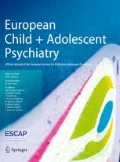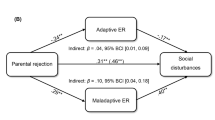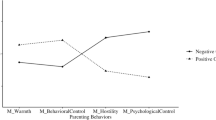Abstract
Among factors predicting adolescent mood problems, certain aspects of the parent–adolescent relationship play an important role. In previous studies, children whose parents had an authoritative style of parenting reported the best behavioral and psychological outcomes. Therefore, the main goal of this paper was to investigate the role of authoritative parenting style and other family variables (negative family interactions and positive identification with parents) in adolescents’ depressive symptomatology. The study was carried out in all primary and secondary schools in Mako and the surrounding region in Hungary in the spring of 2010, students of grades 7–12 (N = 2,072): 49.2% of the sample were males; 38.1% primary school pupils; and 61.9% high school students. Self-administered questionnaires contained items of measuring depressive symptoms (CDI) and parental variables beyond sociodemographics. Beyond descriptive statistics and calculation of correlation coefficients, multiple linear regression analyses were applied to detect relationships between parental variables and depressive scores by gender. Overall, our data support a negative association between authoritative parenting style and adolescent mood problems, particularly among girls. Among boys, only mother’s responsiveness was a significant predictor. Among girls, father’s parenting played a decisive role; not only his responsiveness but also demandingness. Interestingly, mother’s demandingness went together with an elevated depressive score for girls. Prevention programs cannot guarantee success without taking into account the role of parents. Teaching positive parenting seems to be a part of these prevention programs that may include facilitating intimate yet autonomous relationships.
Similar content being viewed by others
References
Ackard D, Neumark-Sztainer D, Story M, Perry C (2006) Parent–child connectedness and behavioral and emotional health among adolescents. Am J Prev Med 30:59–66
Allen JP, Porter M, McFarland C, McElhaney KB, Marsh P (2007) The relation of attachment security to adolescents’ paternal and peer relationships, depression, and externalizing behavior. Child Dev 78:1222–1239
Anli I, Karsli A (2010) Perceived parenting style, depression and anxiety levels in a Turkish late-adolescent population. Proc Soc Behav Sci 2:724–727
Beardslee WR, Gladstone RG (2001) Prevention of childhood depression. Recent findings and future prospects. Biol Psychiatr 49:1101–1110
Brassai L, Piko B (2008) Egyéni, családi és transzperszonális tényezők szerepe a táplálkozáskontrollban serdülőknél (The role of individual, familial and transpersonal variables in adolescent diet control). Mentálhig Pszichoszom 9(2):165–181 (in Hungarian)
Browning CR, Leventhal T, Brooks-Gunn J (2005) Sexual initiation in early adolescence: the nexus of parental and community control. Am Sociol Rev 70:758–778
Connell AM, Dishion TJ (2008) Reducing depression among at-risk early adolescents: three-year effects of a family-centered intervention embedded within schools. J Fam Psychol 22:574–585
Darling N, Steinberg L (1993) Parenting style as context: an integrative model. Psychol Bull 113:487–496
Dekker MC, Ferdinand RF, van Lang ND, Bongers IL, van der Ende J, Verhulst FC (2007) Developmental trajectories of depressive symptoms from early childhood to late adolescence: gender differences and adult outcome. J Child Psychol Psychiatry 48:657–666
Devine D, Kempton T, Forehand R (1994) Adolescent depressed mood and youth adult functioning: a longitudinal study. J Abnorm Child Psychol 22:629–640
Difilippo JM, Overholser JC (2002) Depression, adult attachment, and recollections of parental caring during childhood. J Nerv Ment Dis 190:663–669
Dwairy M, Menshar KE (2006) Parenting style, individuation, and mental health of Egyptian adolescents. J Adolesc 29:103–117
Finkenauer C, Engels RCME, Baumeister RF (2005) Parenting behaviour and adolescent behavioural and emotional problems: the role of self-control. Int J Behav Dev 29:58–69
Furstenberg FF, Cook TD, Eccles J, Elder GH, Sameroff A (1990) Managing to make it: urban families and adolescent success. The University of Chicago Press, Chicago
Gerlsma C, Snijders TAB, Van Duijn MAJ, Emmelkamp PMG (1997) Parenting and psychopathology: differences in family members’ perceptions of parental rearing styles. Person Indiv Diff 23:271–282
Gutman LM, Eccles JS, Opeck S, Malachuk O (2010) The influence of family relations on trajectories of cigarette and alcohol use from early to late adolescence. J Adolesc 34(1):119–128
Hair EC, Moore KA, Garrett SB, Ling T, Cleveland K (2008) The continued importance of quality parent–adolescent relationships during late adolescence. J Res Adolesc 18:187–200
Huver RME, Engels RCME, Verhulmst AA, de Vries H (2007) Is parenting style a context for smoking-specific parenting practices? Drug Alcohol Depend 89:116–125
Jackson C (2002) Perceived legitimacy of parenting authority and tobacco and alcohol use during early adolescence. J Adolesc Health 31:425–432
Jackson C, Henriksen L, Foshee VA (1998) The authoritative parenting index: predicting health risk behaviors among children and adolescents. Health Educ Behav 25:319–337
Kovacs M (1992) Children’s depression inventory (CDI). Multi-Health Systems, Toronto
Laursen B, Coy KC, Collins WA (1998) Reconsidering changes in parent–child conflict across adolescence: a meta-analysis. Child Dev 69:817–832
Lee A, Hankin BL, Mermelstein RJ (2010) Perceived social competence, negative social interactions, and negative cognitive style predict depressive symptoms during adolescence. J Clin Child Adolesc Psychol 39:603–615
Liu Y-L (2006) Paternal–maternal attachment, peer support, social expectations of peer interaction, and depressive symptoms. Adolescence 41:705–721
Maccoby EE (1992) The role of parents in the socialization of children: a historical review. Dev Psychol 28:1006–1017
Maccoby EE, Martin JA (1983) Socialization in the context of the family: parent–child interaction. In: Hethington EM (ed) Handbook of child psychology, vol 4. Socialization, personality, and social development. Wiley, New York, pp 1–101
Manongdo JA, Garcia R (2007) Mothers’ parenting dimensions and adolescent externalizing and internalizing behaviors in a low-income, urban Mexican American sample. J Clin Child Adolesc Psychol 36:593–604
Oshino S, Suzuki A, Ishii G, Otani K (2007) Influences of parental rearing on the personality traits of healthy Japanese. Compr Psychiatr 48:465–469
Patock-Peckham JA, Morgan-Lopez AA (2007) College drinking behaviors: mediational links between parenting styles, parental bonds, depression, and alcohol problems. Psychol Addict Behav 21:297–306
Pellerin LA (2005) Applying Baumrind’s parenting typology to high schools: toward a middle-range theory of authoritative socialization. Soc Sci Res 34:283–303
Pettit GS, Laird RD, Dodge KA, Bates JE, Criss MM (2001) Antecedents and behavior-problem outcomes of parental monitoring and psychological control in early adolescence. Child Dev 72:583–598
Pierce JP, Distefan JM, Jackson C, White MM, Gilpin EA (2002) Does tobacco marketing undermine the influence of recommended parenting in discouraging adolescents from smoking? Am J Prev Med 23:73–81
Piko B (2001) Gender differences and similarities in adolescents’ ways of coping. Psychol Rec 51:223–235
Piko B, Brassai L (2007) Cultural values and health-related behaviors: a comparison of Hungarian and Transylvanian youth. Eur J Ment Health 2(2):171–181
Piko B, Kovacs E, Fitzpatrick KM (2009) Parental, school-related and individual protective factors for adolescent depressive symptomatology. Eur Child Adolesc Psychiatr 18:617–624
Piko BF, Fitzpatrick KM (2003) Depressive symptomatology among Hungarian youth: a risk and protective factors approach. Am J Orthopsychiatry 73:44–54
Radziszewska B, Richardson JL, Dent CW, Flay BR (1996) Parenting style and adolescent depressive symptoms, smoking, and academic achievement: ethnic, gender, and SES differences. J Behav Med 19:289–305
Reed L, Richards MH, Moneta G, Holmbeck G, Duckett E (1996) Changes in adolescents’ daily interactions with their families from ages 10 to 18: disengagement and transformation. Dev Psychol 32:744–754
Reti IM, Samuels JF, Eaton WW, Bienvenu J III, Costa PT Jr, Nestadt G (2002) Influences of parenting on normal personality traits. Psychiatr Res 111:55–64
Richter J, Richter G, Eisemann M, Seering B, Bartsch M (1995) Depression, perceived parental rearing and self-acceptance. Eur Psychiatr 10:290–296
Rothrauff TC, Cooney TM, An JS (2009) Remembered parenting styles and adjustment in middle and late adulthood. J Gerontol Ser B Psychol Sci Soc Sci 64:137–146
Scharf M, Mayseless O, Kivenson-Baron I (2004) Adolescents’ attachment representations and developmental tasks in emerging adulthood. Dev Psychopathol 40(3):430–444
Steinberg GL, Elmer JD, Mounts NS (1989) Authoritative parenting, psychosocial maturity, and academic success among adolescents. Child Dev 60:1424–1436
Weisz JR, Southam-Gerow MA, McCarty CA (2003) Control-related beliefs and depressive symptoms in clinic-referred children and adolescents. J Abnorm Psychol 110:97–109
Yoshizumu T, Murase S, Murakami T, Takai J (2007) Dissociation as a mediator between perceived parental rearing style and depression in an adult community population using college students. Person Indiv Diff 43:353–364
Acknowledgments
This study was supported by the ETT 012-08/2009 research grant of the Ministry of Health Care (Hungary) and in the frame of the following personal research grant: TÁMOP 4.2.1.-B/09/0/KONV-2010-005.
Conflict of interest
None.
Author information
Authors and Affiliations
Corresponding author
Rights and permissions
About this article
Cite this article
Piko, B.F., Balázs, M.Á. Control or involvement? Relationship between authoritative parenting style and adolescent depressive symptomatology. Eur Child Adolesc Psychiatry 21, 149–155 (2012). https://doi.org/10.1007/s00787-012-0246-0
Received:
Accepted:
Published:
Issue Date:
DOI: https://doi.org/10.1007/s00787-012-0246-0




